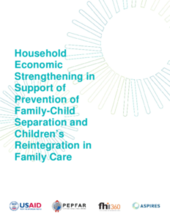This paper presents an overview of learning related to the prevention of family-child separation, the reintegration of children into family care, and economic interventions that support both. It was prepared by FHI 360’s Accelerating Strategies for Practical Innovation and Research in Economic Strengthening (ASPIRES) project to inform the focus and development of a USAID DCOF-funded sub-project intended to develop the evidence base related to the ways in which household-level economic strengthening interventions can help prevent the unnecessary separation of children from their families and support reintegrating separated children in family care in low- and middle-income countries and is shared as a resource for other actors.
The paper draws on recent literature reviews, studies, program reports, resource documents and other gray literature to briefly define economic strengthening (ES) or household economic strengthening (HES) and describe the activities therein, as well as to describe the situation of children outside of family care globally and highlight international policy frameworks and guidance relevant to these children.
The paper presents findings, makes recommendations, and proposes a number of questions for further research. Recommendations outlined in the paper include: linking families with government-led social protection and local economic empowerment programs, holding emergency funds to help families reintegrating children or at very high risk of separation to cope with shocks, investigating sequenced HES approaches with realistic expectations, working on tools and approaches to capture separation risk and durability of reintegration, and hypothesizing and testing causal pathways related to HES interventions and drivers of family-child separation.

